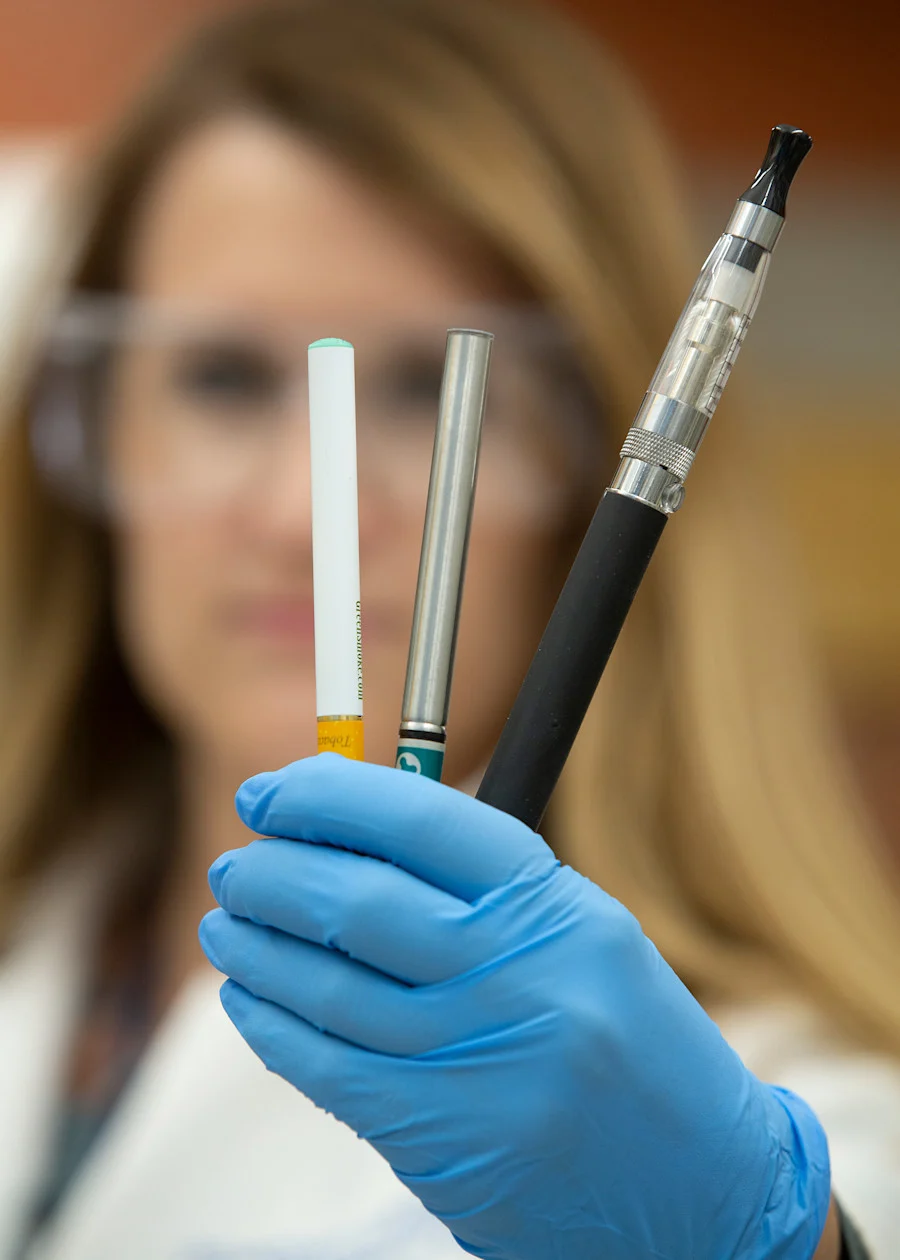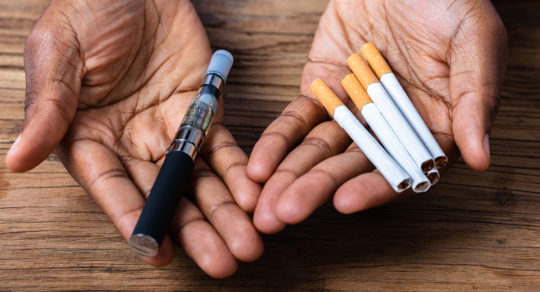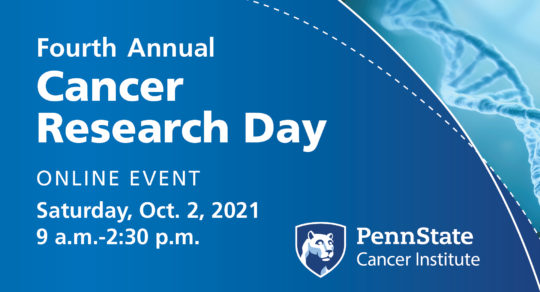Centers
Center for Research on Tobacco and Health
Research
In This Section
Center for Research on Tobacco and Health
Welcome to Penn State Center for Research on Tobacco and Health
Penn State Center for Research on Tobacco and Health’s mission is to be a national leader of scientific discovery that will translate into effective interventions and policies to reduce tobacco-caused harm in our communities.
The center comprises a multidisciplinary team of experts, including basic scientists, public health researchers and medical professionals, all dedicated to improving the lives of people touched by tobacco and nicotine addiction. It is based at Penn State College of Medicine and Penn State Health Milton S. Hershey Medical Center in Hershey, Pa.
More than 16 million Americans are living with a disease caused by smoking. Across the world, tobacco is the leading cause of preventable death. The center’s overall goal is to conduct innovative research that will inform future policymaking on tobacco and health, investigate the toxicology and addictiveness of new and existing tobacco products and discover new treatments for addiction.

TCORS
Tobacco Center of Regulatory Sciences
Penn State College of Medicine received a five-year, $20 million federal grant to investigate the harmful effects of alternative tobacco products, research that will help with better regulation and improve public health.The College is one of just seven sites across the country to receive the grant as part of the Food and Drug Administration (FDA) and National Institutes of Health’s (NIH) Tobacco Centers of Regulatory Science (TCORS) funding that was awarded in the fall of 2023.
The TCORS award will fund a trio of studies, led by the College’s Center for Research on Tobacco and Health, that explore how the design of alternative tobacco products can affect their toxicity and addictiveness.
“Our center is unique in that we are addressing both the chemical toxicity of tobacco products (the part that causes harms directly to the human body), and the addictiveness of tobacco products (the characteristic that results in people using tobacco products for decades rather than a few months or years),” said Jonathan Foulds, PhD, one of the principle investigators. “It is the combination of these two factors that determines the overall health effects.”
Information for Study Participants
The Center for Research on Tobacco and Health is currently conducting several studies on nicotine, smoking and health.Some of the studies are for people who are not planning to quit, and some are for people interested in quitting in the next 30 days.
Researchers will contact you about any available studies that you may qualify for. Interested participants may also call 844-207-6392 for details.
Study visits for people participating in smoking studies through the Center for Research on Tobacco and Health will either take place in the Clinical Research Center or the Center for NMR Research on the campus of Penn State Health Milton S. Hershey Medical Center and Penn State College of Medicine in Hershey, Pa.
Getting to the Clinical Research Center
Once you are on the Penn State Health Campus (500 University Drive, Hershey, Pa 17033), please follow the directions below to park and get to the Clinical Research Center for your study appointment.
Directions to your study appointment
You can park for free at the Centerview Parking Garage (
). Levels 1 and 2 are designated for visitor parking but you may park on any level.
Head to the shuttle stop on Level 2 of the parking garage.
You may enter at the main hospital entrance (
) and walk down the corridor to the Lion statue and make a right to the North elevators .
Alternatively, you may take the shuttle to the North Entrance (
). The Clinical Research Center is on the 4
th
floor using the North elevators.
Note: this entrance is restricted to badge access only.
Please give yourself extra time to get to the study center once you park.
The Centerview Parking Garage is marked Number 7 on the campus map, and the main hospital entrance is marked 6.
The Clinical Research Center is a dedicated space on the fourth floor of Penn State Health Milton S. Hershey Medical Center.
Getting to the Center for NMR Research
The Center for NMR Research is at 30 Long Lane in Hershey, Pa.
The Center for NMR Research is in the NMR building, a separate building behind the main hospital. (This is Location 10 on the campus map.)
Those coming to the Center for NMR Research for study visits should use 30 Long Lane, Hershey, Pa., 17033, as the GPS address to get to campus.Once on Long Lane, drivers can bear left into the NMR Research Parking Lot next to a beige one-story building.
The first two slots are designed as patient parking. Study participants should use the entrance on right side of building, which opens into the waiting room.
Information for Researchers
The Penn State Center for Research on Tobacco and Health originally began in 2013 when investigators at Penn State (PIs: Joshua Muscat and Jonathan Foulds) were awarded one of 14 Tobacco Centers of Regulatory Science (TCORS), a five-year, $20 million center grant, from the U.S. Food and Drug Administration and the National Institutes of Health. The general purpose of the TCORS grants are to support scientific research to inform the regulation of tobacco products. The overarching goal of the Penn State TCORS was to understand the health impact of tobacco-harm reduction policies in vulnerable (e.g. low socioeconomic status, mental disorders) and minority populations.
The TCORS 2013 program included three separate projects:
Switching to progressively reduced nicotine content cigarettes in smokers with lower socioeconomic status (PIs: Joshua Muscat and Kimberly Horn, George Washington University)
Reduced nicotine cigarettes in smokers with mood and anxiety disorders (PIs: Jonathan Foulds and Eden Evins, Harvard University)
Switching to reduced oxidant or nicotine content cigarettes in smokers (PI: John Richie)
In 2023, the Center for Research on Tobacco and Health was awarded one of seven TCORS grants (PIs: Joshua Muscat and Jonathan Foulds), which aims to better understand how physical design and chemical constituents affect the toxicity and addictiveness of nicotine and tobacco products. The TCORS 2023 program will draw on the expertise of many researchers at Penn State including biochemists, statisticians, clinical psychologists, health behaviorists and epidemiologists.
The TCORS 2023 program includes three separate projects:
Translational Studies on Temperature and Solvent Effects on Electronic Cigarette-Derived Oxidants (PIs: Zachary Bitzer and Thomas Spratt)
Oxidative Stress and Harmful Constituent Levels Associated with Little Cigars (PI: Joshua Muscat)
Randomized Placebo-controlled Trial of Nicotine Pouches in Smokers (PIs: Jonathan Foulds and Jason Robinson, University of Texas MD Anderson)
A component of each of the TCORS grants is to incorporate training and funding opportunities for early career, non-tenured scientists interested in pursuing tobacco regulatory science research. Scholars in the TCORS 2013 program completed a series of courses on tobacco regulation, the epidemiology of smoking and biomarkers, and participated in networking events with scholars from other TCORS institutions. The program also supported several postdoctoral scholars who have now moved onto to scientific careers in FDA’s Center for Tobacco Products or as tenure-track professors.
Additionally, the TCORS 2013 program provided pilot funding to 15 Penn State investigators. Projects funded ranged from studies evaluating the impact of electronic cigarette use among HIV positive smokers to evaluating free radical production from charcoal filters.
The newly funded TCORS will again announce pilot award opportunities. Openings for pre-doctoral and post-doctoral positions will also be posted. Both of these mechanisms will advance the careers of upcoming and early stage researchers who are interested in pursuing tobacco regulatory science.
Finally, the Penn State Center for Research on Tobacco and Health is designed to facilitate and coordinate not only the goals and accomplishments of the TCORS grants, but also all research on nicotine and tobacco conducted by Penn State faculty. The goal of the Center is to produce synergy and create collaborations between interdisciplinary researchers who are interested in understanding addiction and reducing the health effects of nicotine and tobacco products.
Nicotine Dependence Index
The Penn State Nicotine Dependence Index was developed by Dr. Jonathan Foulds in 2011.This 10-item scale (with scores ranging from 0 to 20) was developed to measure nicotine dependence across all nicotine product types, and an adapted version was the first dependence measure designed to evaluate electronic cigarette dependence.The index is available for use by clinicians and researchers at other institutions using the proper citation.
See more about the Dependence Index
MRI Electronic Aerosol Delivery System (MEADS)
The MRI Electronic Aerosol Delivery System was developed through a collaboration between the Center for Research on Tobacco and Health, the Center for NMR Research and University Park.The device works in coordination with an olfactometer to deliver up to four e-cigarette aerosols for functional MRI experiments.With questions on this device, contact Dr. Andrea Hobkirk or Dr. Zachary Bitzer.
See protocol paper in Substance Abuse: Research and Treatment
A number of facilities are available for smoking and tobacco research at Penn State.
The Clinical Research Center is a dedicated space on the fourth floor of Penn State Health Milton S. Hershey Medical Center.
The Center for NMR Research is at 30 Long Lane in Hershey, Pa.
Laboratory space for the Center for Research on Tobacco and Health is available on the third floor of Penn State Cancer Institute.
The MRI laboratory is part of the Center for NMR Research at Penn State College of Medicine.
Penn State is also home to this human smoking and addiction laboratory space.
Penn State Center for Research on Tobacco and Health also makes use of this smoking health and behavior laboratory at Penn State University Park.
The following list shows a selection of current research grant funding for Center for Research on Tobacco and Health faculty members.


